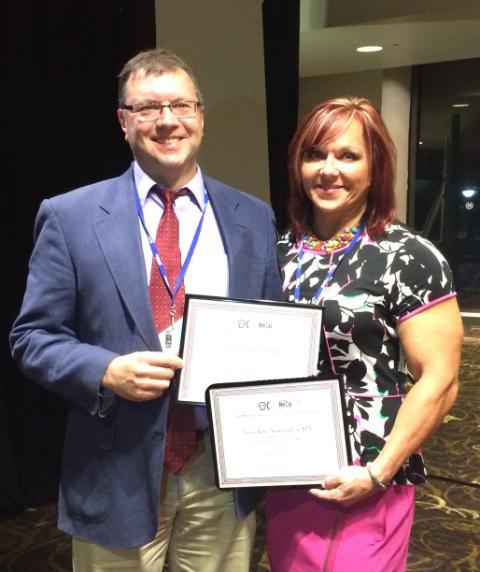Two Employees Celebrate 20 Years as Certified Specialists in Poison Information
Designation, acquired following a stringent testing process, recognizes depth and breadth of knowledge concerning poisoning situations.
By: Sylvia A. Bolls
Monday, March 23, 2015

For two employees of the Maryland Poison Center at the University of Maryland School of Pharmacy, this year marks a special anniversary – more than 20 years with a highly sought after but difficult to attain distinction: certification as a specialist in poison information (CSPI). For Lisa Aukland, PharmD ‘92, and Eric Schuetz, BSPharm ’86, the certification recognizes their in-depth knowledge of how to handle any potential poisoning situation they might encounter as they work the phones at the MPC.
“One hundred percent of the poison information specialists who answer the phones at the Maryland Poison Center have achieved CSPI certification, surpassing the 50 percent requirement to be an accredited center,” says Bruce Anderson, PharmD, DABAT, director of the MPC and an associate professor of pharmacy practice and science at the School. “Drs. Aukland and Schuetz were some of the earliest poison information specialists at the center to seek this certification, which has inspired other staff to follow in their footsteps. Marking more than 20 years with the CSPI credential is a testament to their years of experience, their ability to adapt to the changes we have seen in the types of calls we received, and their detailed knowledge of any potential poisoning situation they might encounter on the other end of the phone.”
CSPI is offered by the American Association of Poison Control Centers, of which the MPC is a member. In order to sit for the CSPI exam, a candidate must be a registered nurse, pharmacist, physician or a nationally-certified physician assistant with one year experience, have handled at least 2,000 human exposure cases, and have the recommendation of his or her center director. The three hour exam is given once a year and must be retaken every seven years to maintain the credential. It is designed to “certify that the candidate has sufficient skill, knowledge, education, and experience to provide poison information to the public, health care providers, and public health agencies.” The test includes sections on patient history, calculations, biologics, drugs, household products, pesticides, and more.
Aukland joined the MPC in 1992 following her graduation from the School of Pharmacy and sat for the CSPI examine in 1993. “I was attracted to the Maryland Poison Center because of the challenge the job presented. Pretty soon after I started, I knew I wanted to seek certification,” she says. “The initial certification to become a specialist required me to study. And we weren’t allowed access to reference books or databases during the test. It was a challenging exam because of the inordinate amount of potential poisoning situations we might encounter in our jobs. You never know what is going to be on the other end of the phone.”
According to Angel Bivens, RPh, MBA, CSPI, the MPC’s public education coordinator, a person will be in need of a poison center’s services every eight seconds. From children and teenagers to adults, having access to an accredited poisoned center is critical in helping promptly and accurately treat the person suffering from a poisoning emergency. “The MPC is a free 24-hour a day operation,” says Bivens. “With 100 percent of our poison information specialists credentialed as CSPIs, the public can be assured that they are receiving the best information in the fastest timeframe to help them make decisions about whether or not to seek emergency medical treatment for their situation. Often times, our staff can save someone a trip to the emergency room by working with them over the phone.”
Schuetz joined the MPC in 1991, a few years after graduating from the School of Pharmacy. While in pharmacy school, Schuetz took a clinical toxicology course and spent many hours in the poison center. Schuetz says this early exposure to toxicology and the Poison Center helped him with his career as a CSPI. “Every day on the job I rely on what I learned about the human body and the effects drugs, snakes, spider bites, chemicals and cleaning products have on it,” he says. “As a CSPI, it’s gratifying to be able to so clearly see the impact we have on the people who contact the Maryland Poison Center when they have a poisoning emergency.”
Maintaining the CSPI credential for more than 20 years is challenging, but rewarding for both Aukland and Schuetz. “It’s an honor to work at the Maryland Poison Center with like-minded professionals who as a group are very passionate about this line of work,” says Aukland.
The Maryland Poison Center is certified by the American Association of Poison Control Centers as a regional poison center. It has provided poisoning treatment advice, education, and prevention services to Marylanders since 1972. Its mission is to decrease the cost and complexity of poisoning and overdose care while maintaining and/or improving patient outcomes.